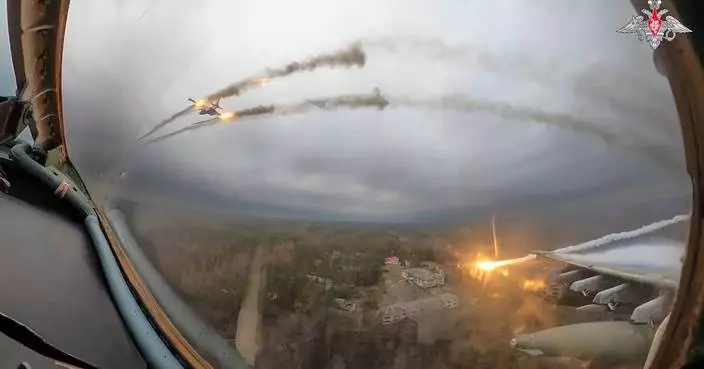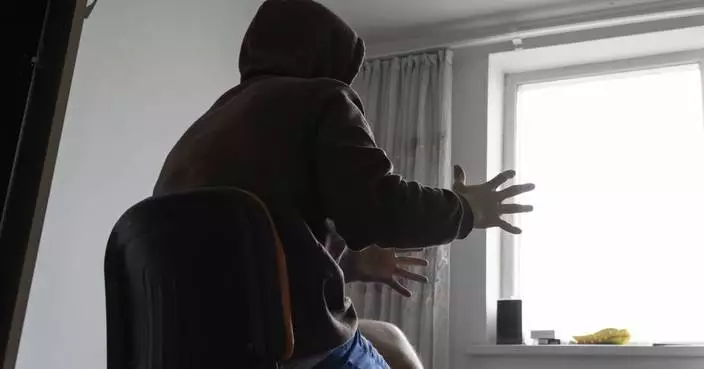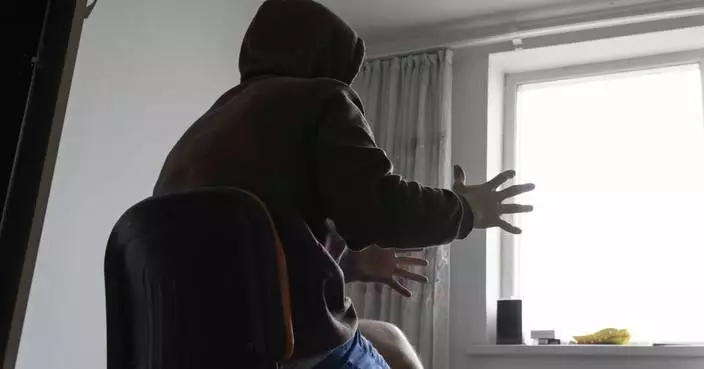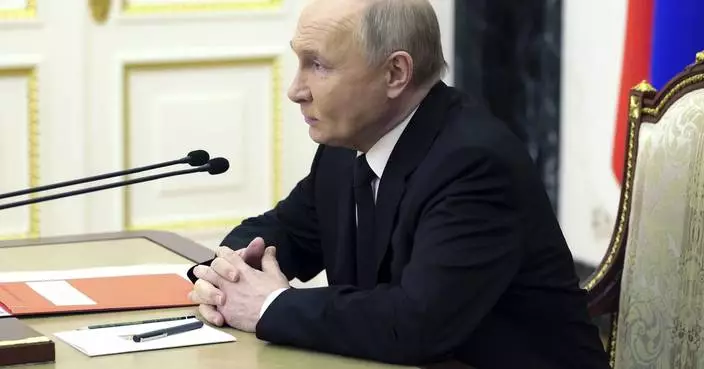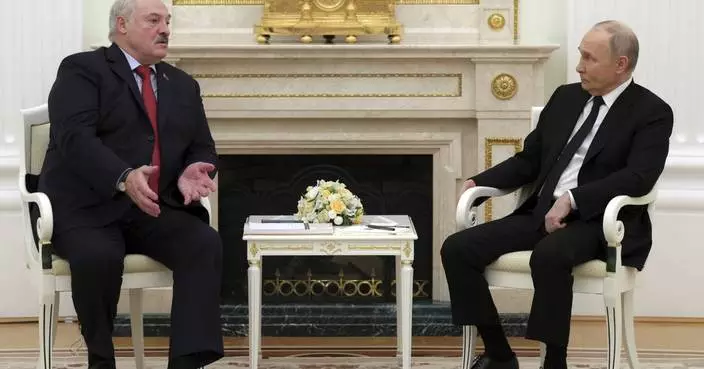Russian President Vladimir Putin on Sunday dismissed British accusations of Russia's involvement in an ex-spy's poisoning as "nonsense," but added that Moscow is ready to cooperate with London in the investigation.
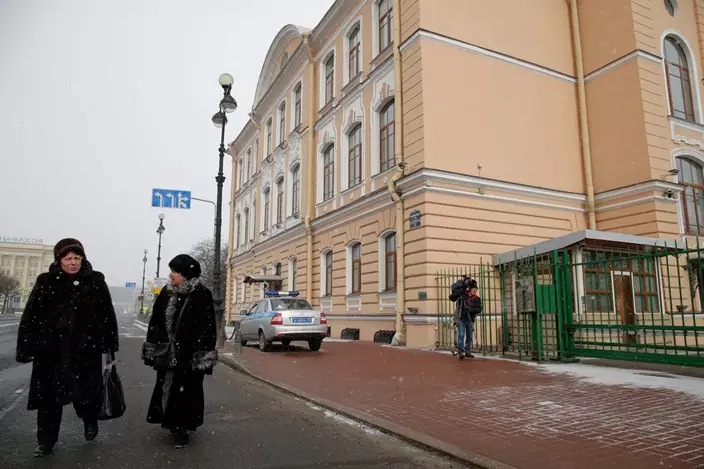
People walk passed the British Consulate General, in St.Petersburg, Russia, Saturday, March 17, 2018. Russia on Saturday announced it is expelling 23 British diplomats and threatened further measures in retaliation in a growing diplomatic dispute over a nerve agent attack on a former spy in Britain. (AP Photo/Dmitri Lovetsky)
In his first comments on the incident, Putin referred to the poisoning of ex-spy Sergei Skripal and his daughter as a "tragedy," but added that if the British claim that they were poisoned by the Soviet-designed nerve agent were true, the victims would have been killed instantly.
Skripal, a former Russian intelligence officer convicted in his home country of spying for Britain, and his daughter have remained in critical condition following the March 4 poisoning.
"It's quite obvious that if it were a military-grade nerve agent, people would have died on the spot," he said. "Russia doesn't have such means. We have destroyed all our chemical weapons under international oversight unlike some of our partners."
Putin's comments came a few hours after British Foreign Secretary Boris Johnson said he has evidence that Russia has been stockpiling a nerve agent in violation of international law "very likely for the purposes of assassination."

FILE - In this Friday, March 16, 2018 file photo, Britain's Foreign Secretary Boris Johnson speaks at a joint press conference with the Polish Foreign Minister Jacek Czaputowicz during a visit to the Battle of Britain Bunker, in Uxbridge, England. (Tolga Akmen/Pool Photo via AP, File)
Johnson said the trail of blame for the poisoning of Skripal and his daughter Yulia in the English city of Salisbury "leads inexorably to the Kremlin."
Johnson told reporters that Britain has information that within the last 10 years, "the Russian state has been engaged in investigating the delivery of such agents, Novichok agents ... very likely for the purposes of assassination."
He said "they have been producing and stockpiling Novichok, contrary to what they have been saying."
Putin dismissed the British accusations, emphasizing that an attack on Skripal would make no sense.
"Any reasonable man would understand that it's just sheer nonsense, complete rubbish to think that anyone in Russia could do anything like that in the run-up to the presidential election and the World Cup," he said. "It's simply unthinkable."
At the same time, Putin, who won another six-year term in Sunday's election, said that Moscow is open for taking part in the probe together with Britain.
"We are ready for cooperation. We said it right away," he said. "We are ready to take part in the investigation, but it's necessary that the other side shows interest in that too. We haven't seen that, but we don't exclude the possibility of joint work."
Johnson said he will brief European Union foreign ministers on the case Monday before meeting with NATO Secretary-General Jens Stoltenberg.
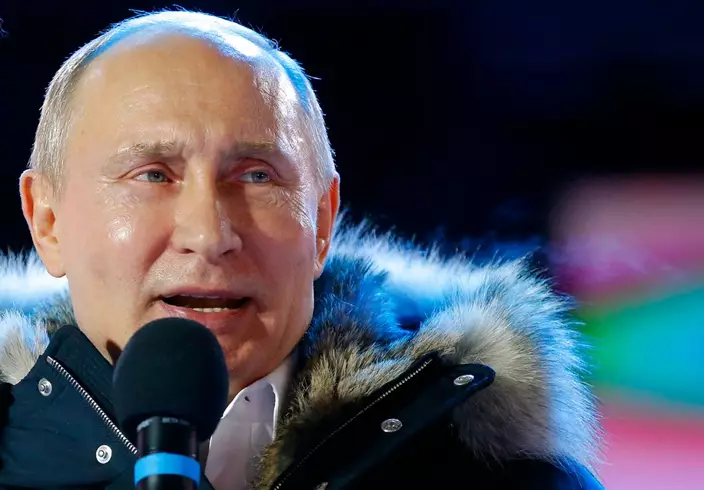
Russian President Vladimir Putin speaks to supporters during a rally near the Kremlin in Moscow, Sunday, March 18, 2018. An exit poll suggests that Vladimir Putin has handily won a fourth term as Russia's president, adding six more years in the Kremlin for the man who has led the world's largest country for all of the 21st century. (AP Photo/Alexander Zemlianichenko)
He also said officials from the Netherlands-based Organization for the Prohibition of Chemical Weapons would arrive Monday in Britain to take samples of the nerve agent used to poison the Skripals.
Britain says it is Novichok, a class of powerful nerve agent developed in the Soviet Union toward the end of the Cold War. Tests to independently verify the British findings are expected to take at least two weeks, Britain's Foreign Office said.
Vladimir Chizhov, Moscow's EU ambassador, said Russia has no chemical weapons stockpiles and wasn't behind the poisoning.
"Russia had nothing to do with it," Chizhov told the BBC.
Chizhov pointed out that the U.K. chemical weapons research facility, Porton Down, is only eight miles (12 kilometers) from Salisbury.
Asked whether he was saying that Porton Down was responsible, Chizhov replied: "I don't know."
The British government dismissed the ambassador's suggestion as "nonsense."
Johnson said it was "not the response of a country that really believed itself to be innocent."
Britain and Russia have each expelled 23 diplomats, broken off high-level contacts and taken other punitive steps in the escalating tit-for-tat dispute, which clouded the run-up to Sunday's presidential election in Russia.
Western powers see the poisoning of the Skripals as the latest sign of increasingly aggressive Russian interference in foreign countries.
Johnson said Britain's National Security Council will meet this week to discuss what further measures the country might take.
He said these could include "defending ourselves against cyberattack, (and) looking at any economic measures that could be taken against Russians who corruptly obtained their wealth."
Opposition lawmakers are calling on the British government to clamp down on the illicitly gained money of wealthy Russians in Britain. Critics say U.K. authorities have been slow to investigate the origins of the wealth invested in London's financial district and property market.
The spy dispute has sent U.K.-Russia relations to Cold War-levels of tension.
Russia's ambassador in London, Alexander Yakovenko, called for "cooler heads," telling the Mail on Sunday that the dispute is "escalating dangerously and out of proportion."
HELENA, Mont. (AP) — BNSF Railway attorneys told a Montana jury Friday that the railroad should not be held liable for the lung cancer deaths of two former residents of an asbestos-contaminated Montana town, one of the deadliest sites in the federal Superfund pollution program.
Attorneys for the company say the corporate predecessors of the railroad, owned by Warren Buffett’s Berkshire Hathaway conglomerate, didn't know the vermiculite they hauled over decades from a nearby mine was filled with hazardous microscopic asbestos fibers or that asbestos was dangerous.
BNSF attorney Chad Knight said the railroad could only be held liable if it could have foreseen the health hazards of asbestos based on information available decades ago when the alleged exposures happened.
“In the 50s, 60s and 70s no one in the public suspected there might be health concerns,” Knight said.
The case in federal civil court is the first of numerous lawsuits against the Texas-based railroad corporation to reach trial over its past operations in Libby, Montana. Current and former residents of the small town near the U.S.-Canada border want BNSF held accountable for its alleged role in asbestos exposure that health officials say has killed several hundred people and sickened thousands.
The seven-member jury met briefly Friday and planned to resume deliberations on Monday morning. They were instructed to decide if the railroad was at fault in the deaths and if so, the amount of damages to award to their estates. If the jurors find that the railroad should also face punitive damages, a separate hearing would determine that amount.
Looming over the proceedings is W.R. Grace & Co., a chemical company that operated a mountaintop vermiculite mine 7 miles (11 kilometers) outside of Libby until it was closed 1990. The Maryland-based company played a central role in Libby's tragedy and has paid significant settlements to victims.
U.S. District Court Judge Brian Morris has referred to the the chemical company as “the elephant in the room” in the BNSF trial. He reminded jurors several times that the case was about the railroad's conduct, not W.R. Grace's separate liability.
How much W.R. Grace revealed about the asbestos dangers to Texas-based BNSF and its corporate predecessors has been sharply disputed. The plaintiffs argued that railroad higher-ups were aware, but that workers on the ground in Libby were left out of the loop.
“We're here to make a party that accepts zero responsibility accept an appropriate amount of responsibility,” plaintiffs' attorney Mark Lanier said. “This is the fault of the bigwigs in the corporate office.”
The judge instructed the jury it could only find the railroad negligent based on its actions in the Libby Railyard, not for hauling the vermiculite.
The railroad said it was obliged under law to ship the vermiculite, which was used in insulation and for other commercial purposes. It said W.R. Grace employees had concealed the health hazards from the railroad.
Former railroad workers said during testimony and in depositions that they knew nothing about the risks of asbestos. They said Grace employees were responsible for loading the hopper cars, plugging the holes of any cars leaking vermiculite and occasionally cleaned up material that spilled in the rail yard.
The estates of the two deceased plaintiffs have argued that the W.R. Grace’s actions don’t absolve BNSF of its responsibility for failing to clean up the vermiculite that spilled in the railyard in the heart of the community.
Their attorneys said BNSF should have known about the dangers because Grace put signs on rail cars carrying vermiculite warning of potential health risks. They showed jurors an image of a warning label allegedly attached to rail cars in the late 1970s that advised against inhaling the asbestos dust because it could cause bodily harm.
Family members of Tom Wells and Joyce Walder testified that their lives ended soon after they were diagnosed with mesothelioma. The families said the dust blowing from the rail yard sickened and killed them.
In a March 2020 video of Wells played for jurors and recorded the day before he died, he lay in a home hospital bed, struggling to breathe.
“I’ve been placed in a horrible spot here, and the best chance I see at release — relief for everybody — is to just get it over with,” he said. “It’s just not something I want to try and play hero through because I don’t think that there’s a miracle waiting.”
The Environmental Protection Agency descended on Libby after the 1999 news reports. In 2009 it declared in Libby the nation’s first ever public health emergency under the federal Superfund cleanup program.
The pollution in Libby has been cleaned up, largely at public expense. Yet the long timeframe over which asbestos-related diseases develop means people previously exposed are likely to continue getting sick for years to come, health officials say.
Brown reported from Billings, Montana.
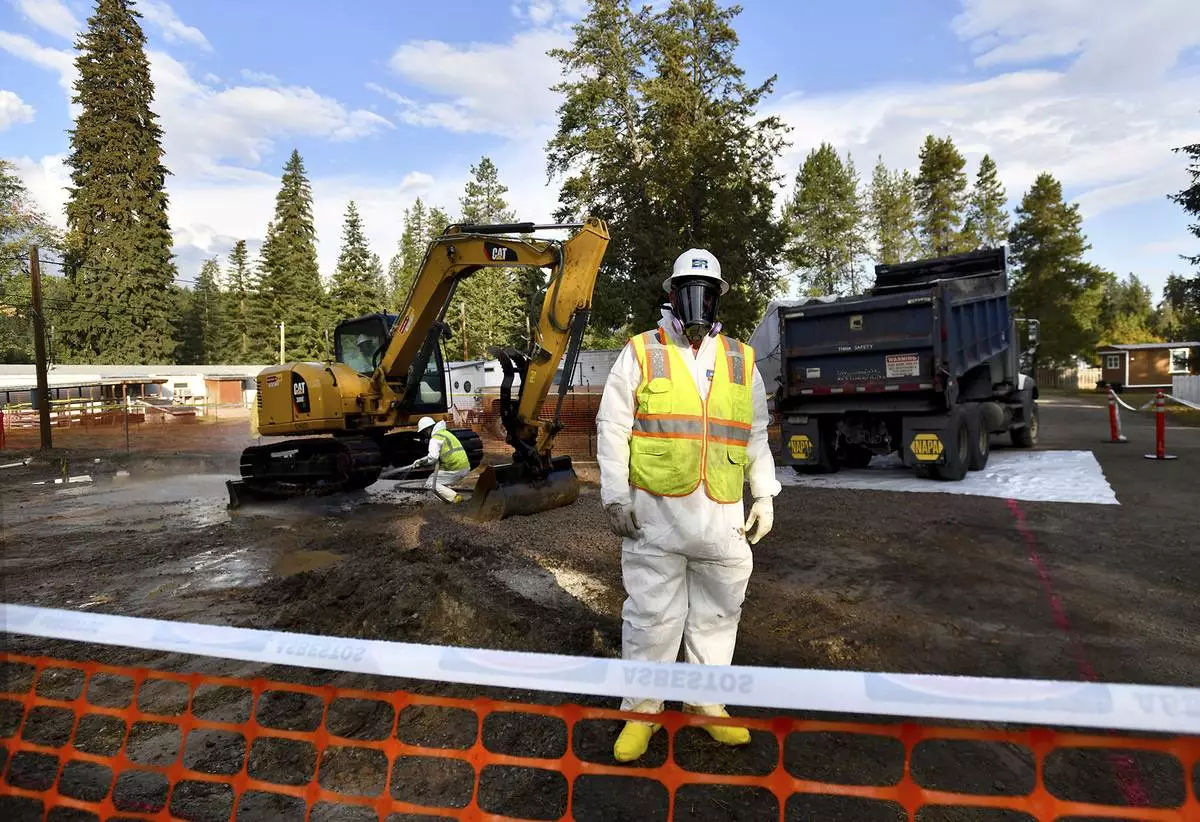
FILE - Environmental cleanup specialists work at one of the last remaining residential asbestos cleanup sites in Libby, Montana, in mid-September. BNSF Railway attorneys are expected to argue before jurors Friday, April 19, 2024, that the railroad should not be held liable for the lung cancer deaths of two former residents of the asbestos-contaminated Montana town, one of the deadliest sites in the federal Superfund pollution program. (Kurt Wilson/The Missoulian via AP, File)
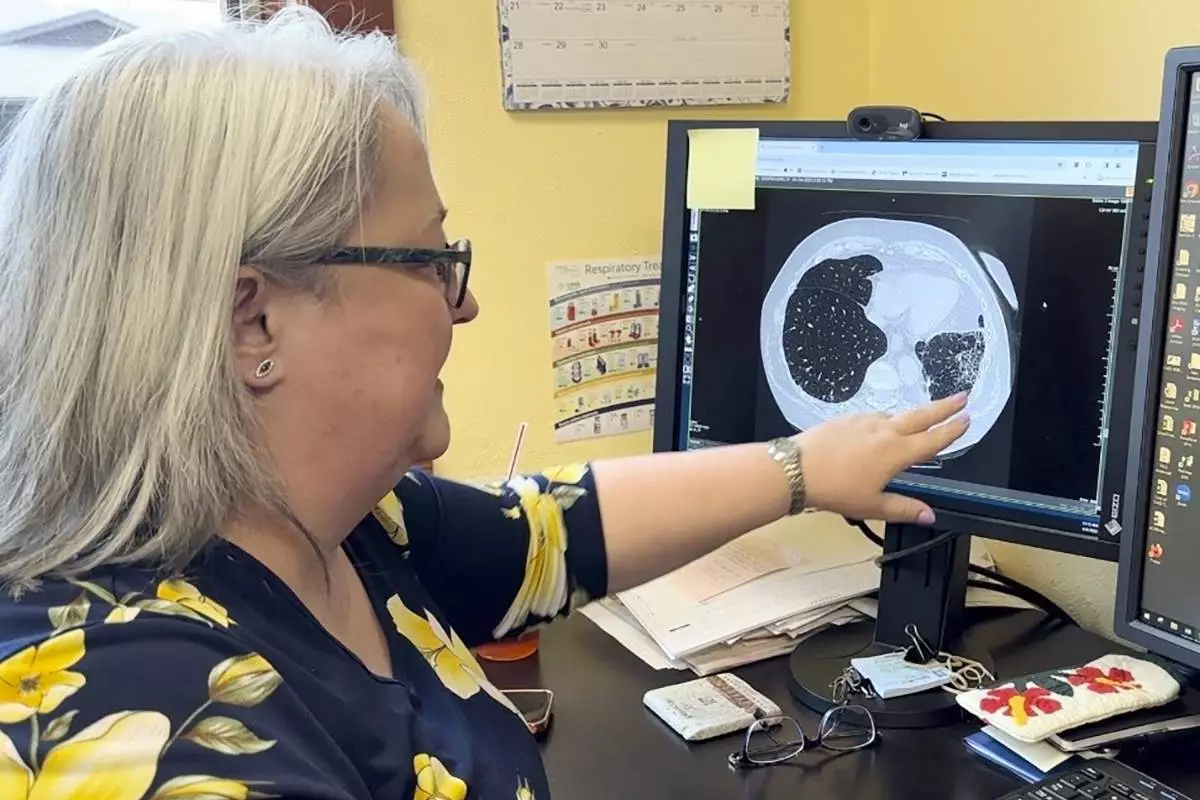
FILE - Dr. Lee Morissette shows an image of lungs damaged by asbestos exposure, at the Center for Asbestos Related Disease, Thursday, April 4, 2024, in Libby, Mont. BNSF Railway attorneys are expected to argue before jurors Friday, April 19, 2024, that the railroad should not be held liable for the lung cancer deaths of two former residents of the asbestos-contaminated Montana town, one of the deadliest sites in the federal Superfund pollution program. (AP Photo/Matthew Brown, File)
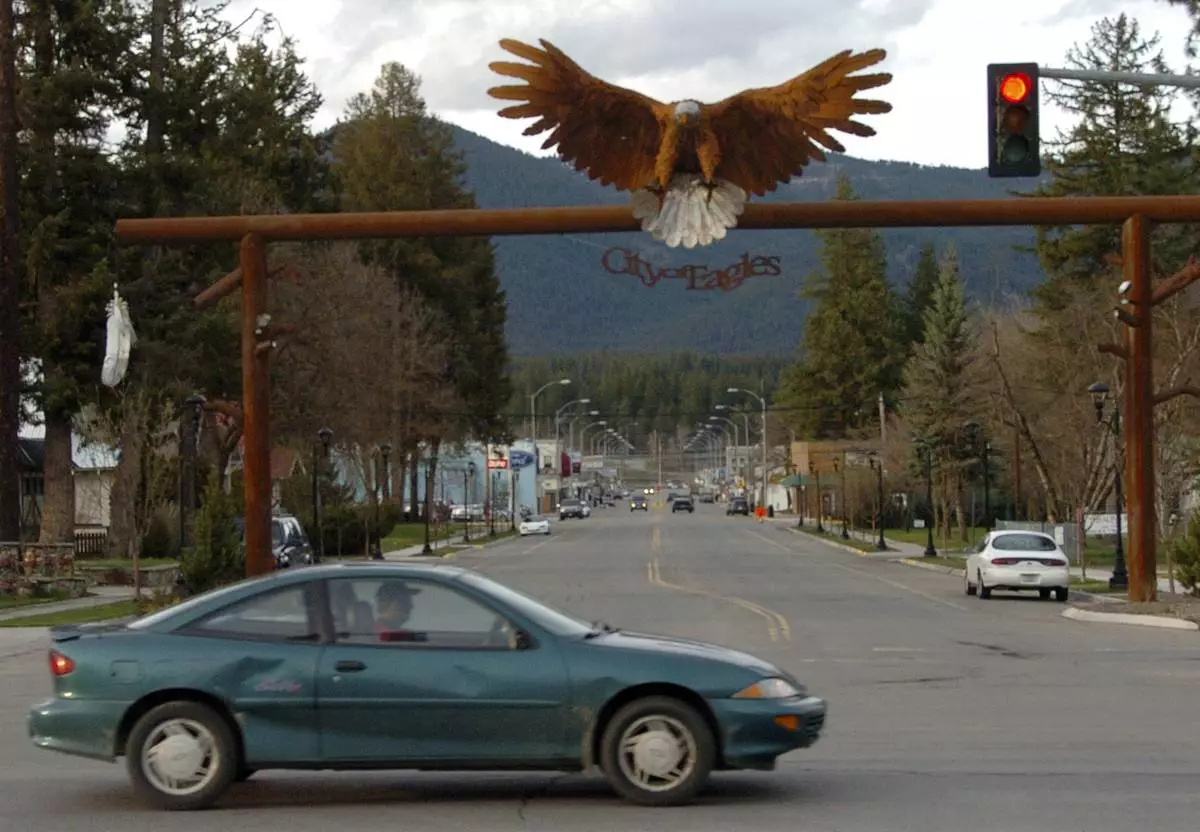
FILE - In this April 27, 2011, file photo, the entrance to downtown Libby, Mont., is seen. BNSF Railway attorneys are expected to argue before jurors Friday, April 19, 2024, that the railroad should not be held liable for the lung cancer deaths of two former residents of the asbestos-contaminated Montana town, one of the deadliest sites in the federal Superfund pollution program. (AP Photo/Matthew Brown, File)









